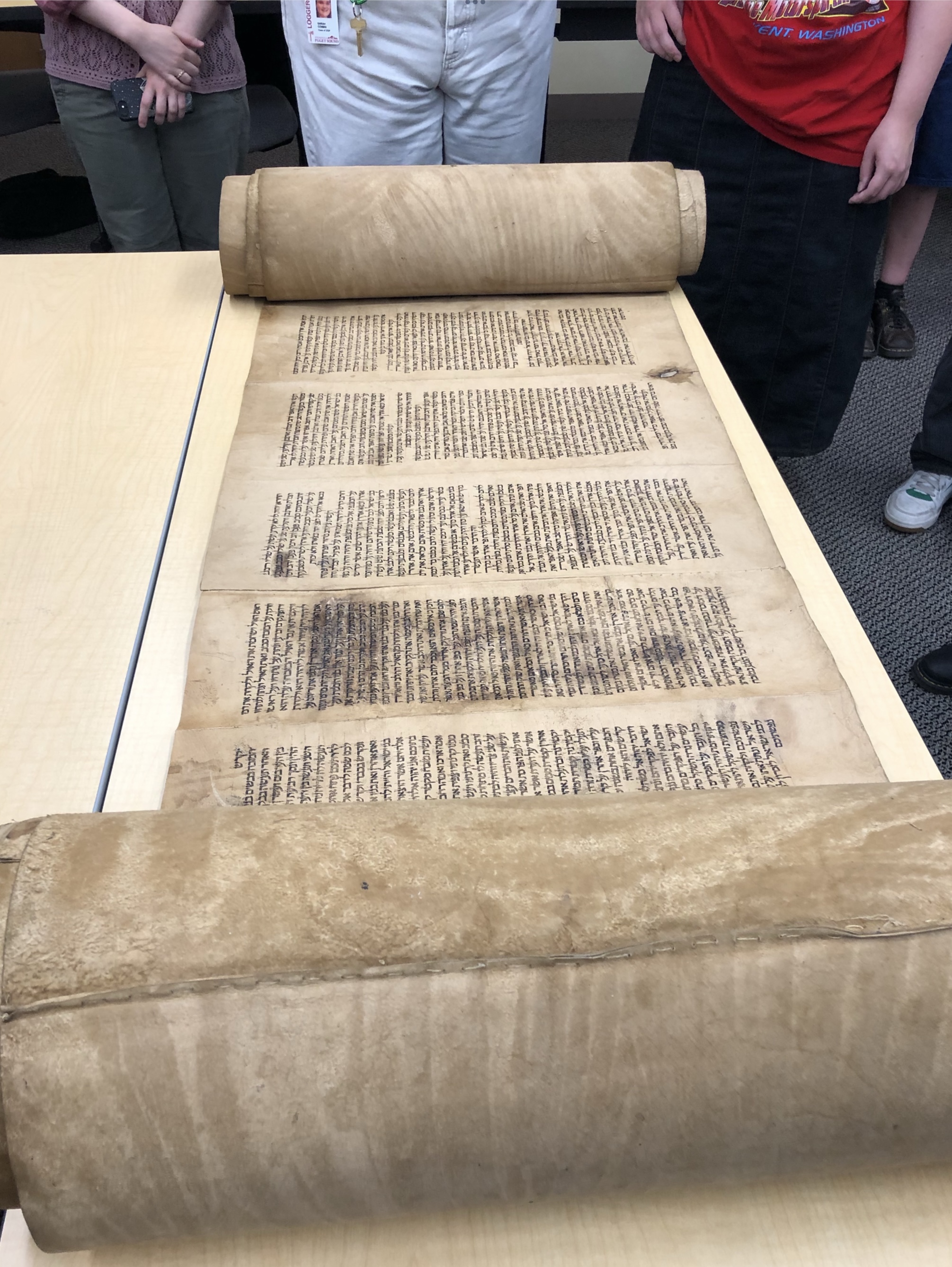
Correction: This article reports that the Torah in the University Archives is 250 years old and was given to the University by an unknown donor. In actuality, the Torah is approximately 170 years old and was donated to the University by Cindy Boyce and is stored in an archival box in the Special Collections vault on the second floor. We at The Trail strive for accuracy in our reporting. When mistakes happen we aim to deal with them productively and with respect for all parties. Please send any corrections to trail@pugetsound.edu.
By Veronica Brinkley
Among the artifacts stored in the Collins Memorial Library basement hides a 250-year-old Torah scroll that was gifted to the University by an unknown donor. The existence of this Torah was not known by anyone in the Chaplaincy or Jewish Student Life on campus until late September when a Jewish student filed a complaint to the Equal Opportunity Office stating that the Torah had been mishandled during a class viewing inside the archives. The Torah is the first five books of the Hebrew Bible — Genesis, Exodus, Leviticus, Numbers, and Deuteronomy — and is one of the most important texts in the Jewish religion. There is a strict set of rules in Jewish custom for properly interacting with a Torah, including how to avoid touching the text directly, and guidelines for carrying and rolling the scroll. The student, who wished to remain anonymous, felt that these rules were not followed. The student also reported that the Torah is not kept in an ark, the traditional storage cabinet where the scroll is stored upright and is instead allegedly stowed in a cardboard box. The Chaplaincy is currently looking into the incident, which has sparked a wider debate about the University’s handling and storage of sacred and historical items.
According to University Chaplain Dave Wright, neither the Chaplaincy nor the Jewish Student Life Coordinator, Cantor Geoff Fine, knew that this Torah existed, having only found out when the report was filed. Jewish Student Union President Audrey Blumental (‘26) says JSU was also completely unaware of the Torah’s existence. “It’s unfortunate and concerning that we didn’t even know we had this resource on campus and that a Jewish student in the class felt that they were in a position where they had to educate the class. I hope that this problem will be rectified and that there will be proper training around handling the Torah going forward,” Blumental said.
Wright, Fine, the Provost’s office, Academic Affairs, and the Archives and Special Collections staff plan to meet soon to coordinate next steps to ensure that the Torah is properly stored and handled going forward. The main goal is to produce a set of guidelines that archive users need to follow to interact with the Torah. “My hope is that this is going to be a conversation about what we have, how we use it in the future, and how we care for it, with the guidance of professional staff who have expertise in the area,” Wright said.
According to Wright, Jewish students on campus have been interested in access to a Torah in the last five years, and even went as far as looking into purchasing one, unaware that one already existed on campus. Unfortunately, purchasing a Torah was deemed cost-prohibitive as it cost nearly $20,000 just to insure. The students opted for bound Tanakhs, the full Hebrew Bible, instead.
Student demand for these religious texts has changed over time. “At this time we don’t have a ton of demand for more religious resources,” Blumental said, citing JSU’s attendance at Temple Beth El as the main resource for religious services. However, she still has concerns about the lack of awareness around the scroll’s existence. “If the time comes when we want to use it, we should get to have access to it. We should at least know it exists,” she said..
It is possible that JSU could gain access going forward; however, given the age of the artifact, the Torah cannot be moved or exposed to the elements. That means it cannot leave the archives and must be monitored by archives staff at all times during usage. This is not ideal for Jewish students hoping to use the Torah for services, but the Chaplaincy is adamant that the safety and preservation of the document come first. “If Jewish students, individually or as a collective, wanted to come and visit the archives to engage the Torah, as a kind of resource, I think it would be a really good opportunity”, said Wright, envisioning a potential Yom Kippur service that involves stopping at the archives to visit the scroll. They emphasize that the most important step going forward is creating a set of rules and guidelines surrounding Torah storage and usage, and ensuring that the archives and its visitors follow those rules carefully. The Chaplaincy hopes that this will offset any harm caused by the alleged mishandling. “It will help our school and our archives, in particular, take best care and prevent such further incidents and hopefully to further conversation in the academic world, as well as student affairs, about how we handle these sorts of very significant artifacts,” they said.
